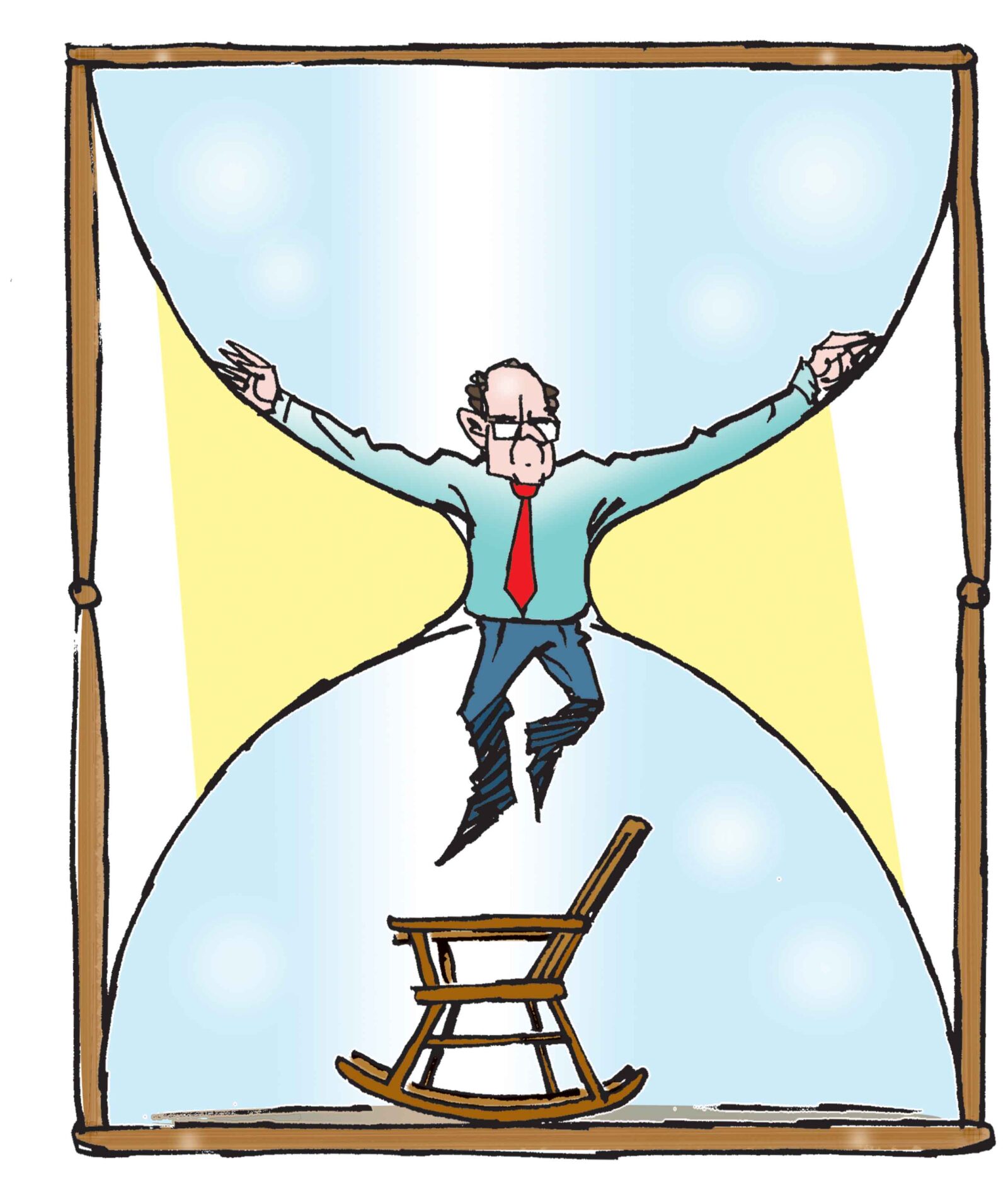THERE was a time when government employees retired at 55 years of age. The received wisdom was that most people died at 50 or, at best, at 55. It then made sense to say goodbye at 55. The government did not have to pay the employee’s pension for too long a period.
As medical facilities improved, the average age kept on increasing. The government was compelled to take note of this trend and raised the age of superannuation to 58. But, the longevity of the average employee went on improving and a stage was reached when there was a clamour for a further increase in the age of retirement.
I was then Member-Secretary of the Fifth Central Pay Commission. We tried to ascertain the situation in other countries. When we visited Canada to make an on-the-spot study, we were astonished by the revelation that a bureaucrat need not retire in Canada. This seemed so absurd that we probed further. How had this situation come about?
We were informed that an employee of the Canadian government had challenged the order retiring him from service on the ground of unconstitutionality. The Constitution laid down with great clarity that no citizen would be discriminated against on the ground of sex, religion, creed, class or age. He was being discriminated against on the ground of age.
The matter went to the Supreme Court of Canada. The court ruled that the objection raised by the employee was valid and upheld his contention. It held that an employee could continue in service as long as he wished and was medically fit. It was entirely his prerogative to decide when he would like to retire.
Were there overage employees still in service, we asked? They had the statistics. We were told that 118 employees above the normal age of retirement were still in service. We also came to know that the Judges of the Supreme Court of the USA had the same privilege. We did not attempt to collect data from all the countries of the world.
When we looked at the demands put by staff associations, we saw that many of them wanted an enhancement of retirement age to 62 or 65. I was not clear what stand we should take. So, I sought an appointment with one of my illustrious predecessors, LP Singh. Singh had been Home Secretary, Government of India, and was highly regarded as a bureaucrat. When I called on him in his office at the Centre for Policy Research, he was quite frank. The retirement age deserved to be raised to 60. But if we recommended 60, it would not go through. He suggested we should propose 62. Then the chances of the government approving 60 were bright.
We discussed the matter in a meeting of the Commission; the consensus was for 60 years. Prof Suresh Tendulkar was not for subterfuge. He said that we should strongly recommend 60 with cogent arguments so that the Government would approve our recommendation. The Chairman, Justice Ratnavel Pandian, concurred. So, 60 it was.
Our recommendation was based on two arguments. One was the usual plea based on statistical figures of longevity. The second, and more potent, argument was that most employees felt they had still a lot of energy left in them and they exerted their utmost to obtain an extension in service by hook or by crook, or to be re-employed in some capacity as consultant or chairman of a public sector undertaking (PSU) or a committee. We strongly inveighed against this tendency and suggested a total ban on extension or re-employment.
When the report was submitted in February 1997, we expected that the same would be implemented immediately. All eyes, especially of those who were about to retire, were glued to the TV sets, hoping to see a government announcement coming forth as ‘breaking news’. Months passed but no announcement came. The grapevine was agog with rumours flying back and forth.
At last, a whisper was heard in the corridors of power that Nand Kishore Singh was due to retire in July 1998 and that the order to raise the retirement age to 60 years would be issued just in time for him to be benefited. And so it proved. Nand Kishore brought in luck for thousands of retirees. The government approved the recommendations in toto.
THE Sixth Pay Commission had also received numerous suggestions pleading for the age of retirement to be raised to 62 or 65.The Commission felt that the expectation of the Fifth Pay Commission that, consequent upon the amendment of age, the tendency among senior officials to try and obtain extension or re-employment would abate had not materialised. It came to the conclusion that any further enhancement in the age of superannuation would not have any impact on that tendency.
In fact, the Sixth Commission quoted figures to prove that the population in the working age group between the ages of 15 and 64 years would increase from 62.9 per cent in 2006 to 68.4 per cent in 2020. It was clearly evident from the statistical trends that India was the beneficiary of a demographic dividend and every passing year would show a higher proportion of younger people in the workforce.
The Commission came to the conclusion that there was no justification for an increase in the age of retirement as it would deny employment opportunities to the fresh entrants into the workforce. It, therefore, recommended that the age of superannuation be maintained. Further, no extension in service should be given, except in the case of scientists and medical specialists.
Meanwhile, some posts had been declared as tenurial posts. Examples at the senior level were Cabinet Secretary, Home Secretary and Defence Secretary. Appointments to these posts are now made for a specified tenure and the incumbents of these posts continue in office till the tenure is over. The Sixth Pay Commission, however, recommended that appointments to tenurial positions should be made carefully so that only persons with enough period of service left were appointed. Thus, the age of superannuation stayed at 60 years after the Sixth Pay Commission made its recommendations.
As far as the Seventh Central Pay Commission is concerned, there was a press report that no staff association had asked for an increase in the age of superannuation. But that was quite some time back. I am quite certain that by now the staff associations must have clamoured for raising the retirement age to 62 or even 65 years.
The Samajwadi Party, which rules Uttar Pradesh at present, has promised in its manifesto that the age of retirement would be raised to 65. But, this seems to be an off-the-cuff promise and one is not sure that the party means it seriously.
The enormous increase in the proportion of the young in the population still continues and is an important parameter to be kept in view while taking a stand on this issue.
It is a fact that the tendency on the part of senior officials to leave no stone unturned while trying to obtain an extension or re-employment in the government or a government-sponsored, owned or controlled entity, has not abated.
Initially, good sense had prevailed on the government and the provision for extension had been removed from the Fundamental Rules. But the Cabinet Secretary got his post exempted from this rule by converting it into a tenurial position. His colleagues did not hesitate in following his lead. Soon the Home Secretary and Defence Secretary were also placed in the same category.
MATTERS came to such a pass that in UPA 2 most of the officers retiring from the IAS or the IFS were drafted as consultants in the government, especially in the Prime Minister’s Office.
The IC Centre for Governance considered this question at great length and concluded that the age of retirement should be raised to 62. This represented a compromise between the suggestion of no change and the proposal for 65 years. Accordingly, a formal proposal has been sent to the Seventh Pay Commission.
As far as I am concerned, when I retired in 2001, I went to my guru, Bhagwan Sri Sathya Sai Baba, for advice. I said, “Baba, I am going to be retired.” Baba said, with a glint in his eyes, “Not retired. Re-tyred.” I asked, “Baba, what should I do now?” He said, “Until now you were doing service (naukri). Now do service (seva).”
That is sound advice for all those about to retire!
MK Kaw is a former Secretary, Government of India












































